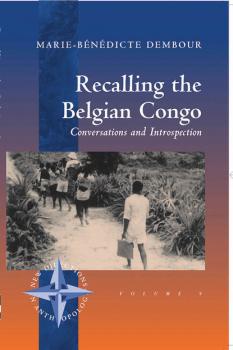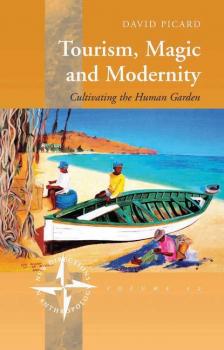New Directions in Anthropology
Скачать книги из серии New Directions in AnthropologyOn the Nervous Edge of an Impossible Paradise
There are beastly forces in Belize. Forces that are actively involved in making paradise impossible. On the Nervous Edge of an Impossible Paradise is a collection of seven stories about local lives in the fictional village of Wallaceville. They turn rogue in the face of runaway forces that take the form and figure of a Belize beast-time, which can appear as a comic mishap, social ruin, tragic excess, or wild guesses. Inciting the affective politics of life in the region, this fable of emergence evokes the unnerving uncertainties of life in the tourist state of Belize.
Nourishing the Nation
In the early twenty-first century, nationalism has seen a surprising resurgence across the Western world. In the Catalan Autonomous Community in northeastern Spain, this resurgence has been most apparent in widespread support for Catalonia’s pro-independence movement, and the popular assertion of Catalan symbols, culture and identity in everyday life. Nourishing the Nation provides an ethnographic account of the everyday experience of national identity in Catalonia, using an essential, everyday object of consumption: food. As a crucial element of Catalan cultural life, a focus on food provides unique insight into the lived realities of Catalan nationalism, and how Catalans experience and express their national identity today.
Burgundy
Drawing on more than twenty years of fieldwork, this book explores the professional, social, and cultural world of Burgundy wines, the role of terroir, and its transnational deployment in China, Japan, South Korea, and New Zealand. It demystifies the terroir ideology by providing a unique long-term ethnographic analysis of what lies behind the concept. While the Burgundian model of terroir has gone global by acquiring UNESCO world heritage status, its very legitimacy is now being challenged amongst the vineyards where it first took root.
Living Before Dying
This in-depth description of life in a nursing/care home for 70 residents and 40 staff highlights the daily care of frail or ill residents between 80 and 100 years of age, including people suffering with dementia. How residents interact with care assistants is emphasised, as are the different behaviours of men and women observed during a year of daily conversations between the author, patients and staff, who share their stories of the pressures of the work. Living Before Dying shows a world where, in extreme old age, people have to learn how to cope with living communally.
A Goddess in Motion
The current practice of the cult of María Lionza is one of the most important and yet unexplored religious practices in Venezuela. Based on long-term fieldwork, this book explores the role of images and visual culture within the cult. By adopting a relational approach, A Goddess in Motion shows how the innumerable images of this goddess—represented as an Indian, white or mestizo woman—move constantly from objects to bodies, from bodies to dreams, and from the religion domain to the art world. In short, this book is a fascinating study that sheds light on the role of visual creativity in contemporary religious manifestations.
Honour and Violence
The practice of karo kari allows family, especially fathers, brothers and sons, to take the lives of their daughters, sisters and mothers if they are accused of adultery. This volume examines the central position of karo kari in the social, political and juridical structures in Upper Sindh, Pakistan. Drawing connections between local contests over marriage and resources, Nafisa Shah unearths deep historical processes and power relations. In particular, she explores how the state justice system and informal mediations inform each other in state responses to karo kari , and how modern law is implicated in this seemingly ancient cultural practice.
Rebordering the Mediterranean
Offering a rich ethnographic account, this book traces the historical processes by which Andalusians experienced the shift from being poor emigrants to northern Europe to becoming privileged citizens of the southern borderland of the European Union, a region where thousands of African immigrants have come in search of a better life. It draws on extended ethnographic fieldwork in Granada and Senegal, exploring the shifting, complementary and yet antagonistic relations between Spaniards and African immigrants in the Andalusian agrarian work place. The author's findings challenge the assumption of fixed national, cultural, and socioeconomic boundaries vis-à-vis outside migration in core countries, showing how legal and cultural identities of Andalusians are constructed together with that of immigrants.
Recalling the Belgian Congo
When the author embarked on her study, her aim was to approach former colonial officers with a view to analyzing processes of domination in the ex-Belgian Congo. However, after establishing a rapport with some of these officers, the author was soon forced to revise her initial assumptions, widely held in present-day Belgium: these officers were not the «baddies» she had expected to meet. Exploring the colonial experience through the respondents' memories resulted in a far more complex picture of the colonial situation than she had anticipated, again forcing her to question her original assumptions. This resulted not only in a more differentiated perspective on Belgian colonialist rule, but is also sensitized her as regards the question of anthropological understanding and of what constitutes historical fact. These two aspects of her work are reflected in this study that offers specific material on the way Belgian colonialism is remembered and reflects on its conditions of production, thus combining ethnographic analysis with a theoretical essay.
Documenting Transnational Migration
Most studies on transnational migration either stress assimilation, circulatory migration, or the negative impact of migration. This remarkable study, which covers migrants from one Jordanian village to 17 different countries in Europe, Asia, and North America, emphasizes the resiliency of transnational migrants after long periods of absence, social encapsulation, and stress, and their ability to construct social networks and reinterpret traditions in such a way as to mix the old and the new in a scenario that incorporates both worlds. Focusing on the humanistic aspects of the migration experience, this book examines questions such as birth control, women’s work, retention of tribal law, and the changing attitudes of migrants towards themselves, their families, their home communities, and their nation. It ends with placing transnational migration from Jordan in a cross-cultural perspective by comparing it with similar processes elsewhere, and critically reviews a number of theoretical perspectives that have been used to explain migration.
Tourism, Magic and Modernity
Drawing from extended fieldwork in La Réunion, in the Indian Ocean, the author suggests an innovative re-reading of different concepts of magic that emerge in the global cultural economics of tourism. Following the making and unmaking of the tropical island tourism destination of La Réunion, he demonstrates how destinations are transformed into magical pleasure gardens in which human life is cultivated for tourist consumption. Like a gardener would cultivate flowers, local development policy, nature conservation, and museum initiatives dramatise local social life so as to evoke modernist paradigms of time, beauty and nature. Islanders who live in this 'human garden' are thus placed in the ambivalent role of 'human flowers', embodying ideas of authenticity and biblical innocence, but also of history and social life in perpetual creolisation.









